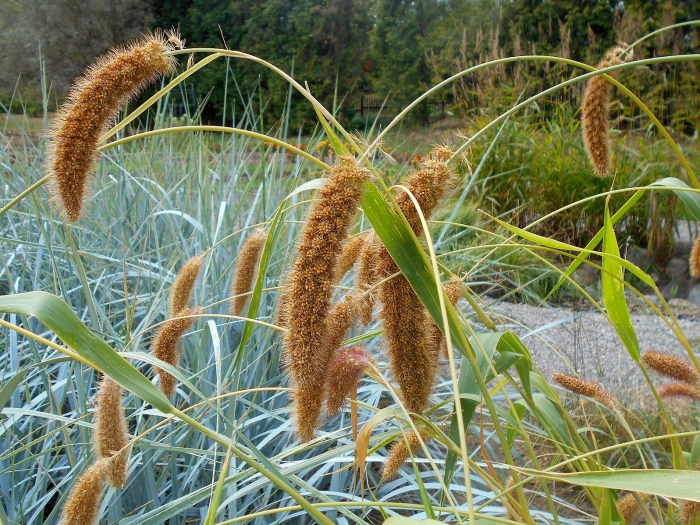Large-Spike Bristlegrass
(Setaria macrostachya)
Large-Spike Bristlegrass (Setaria macrostachya)
/
/

Salicyna
CC BY-SA 4.0
Image By:
Salicyna
Recorded By:
Copyright:
CC BY-SA 4.0
Copyright Notice:
Photo by: Salicyna | License Type: CC BY-SA 4.0 | License URL: https://creativecommons.org/licenses/by-sa/3.0 | Uploader: Salicyna | Publisher: Wikimedia Commons |












Estimated Native Range
Summary
Setaria macrostachya, commonly known as Large-Spike Bristlegrass, is a deciduous perennial grass native to open grasslands, savannas, and light woodlands in Tropical and Subtropical Areas in the Americas. It typically grows to a height and width of 2 feet (0.6 meters), forming dense tufts of foliage. The plant is characterized by its upright form and the large, bristly seed heads that appear in summer, giving it a distinctive appearance. The flower spikes are greenish to purplish, turning a golden brown when mature, and are moderately showy due to their size and texture.
Large-Spike Bristlegrass is valued for its drought tolerance and ability to thrive in poor soils, making it a suitable choice for xeriscaping and naturalistic plantings. It is often used in meadow gardens, as an accent in borders, or for erosion control on slopes. This grass prefers full sun to part shade and is adaptable to a range of soil types, provided they have good drainage. While it requires low to medium amounts of water, it can tolerate periods of drought once established. There are no widely known cultivars of this species, and it is generally free from serious pests and diseases. However, it can self-seed and become weedy in some conditions, so gardeners should monitor its spread.CC BY-SA 4.0
Large-Spike Bristlegrass is valued for its drought tolerance and ability to thrive in poor soils, making it a suitable choice for xeriscaping and naturalistic plantings. It is often used in meadow gardens, as an accent in borders, or for erosion control on slopes. This grass prefers full sun to part shade and is adaptable to a range of soil types, provided they have good drainage. While it requires low to medium amounts of water, it can tolerate periods of drought once established. There are no widely known cultivars of this species, and it is generally free from serious pests and diseases. However, it can self-seed and become weedy in some conditions, so gardeners should monitor its spread.CC BY-SA 4.0
Plant Description
- Plant Type: Grass
- Height: 1.5-2 feet
- Width: 1.5-2 feet
- Growth Rate: Moderate
- Flower Color: N/A
- Flowering Season: Summer, Fall
- Leaf Retention: Deciduous
Growth Requirements
- Sun: Full Sun, Part Shade
- Water: Low, Medium
- Drainage: Fast
Common Uses
Bank Stabilization, Bird Garden, Drought Tolerant, Erosion Control, Low Maintenance, Salt Tolerant
Natural Habitat
native to open grasslands, savannas, and light woodlands in Tropical and Subtropical Areas in the Americas
Other Names
Common Names: Plains Bristle Grass
Scientific Names: , Setaria macrostachya, Pennisetum alopecuros, Chaetochloa gibbosa, Chaetochloa macrostachya, Setaria macrostachys, Panicum macrostachyum, Setaria inopinata, Chamaeraphis macrostachya, Chamaeraphis setosa var. macrostachya
GBIF Accepted Name: Setaria macrostachya Kunth